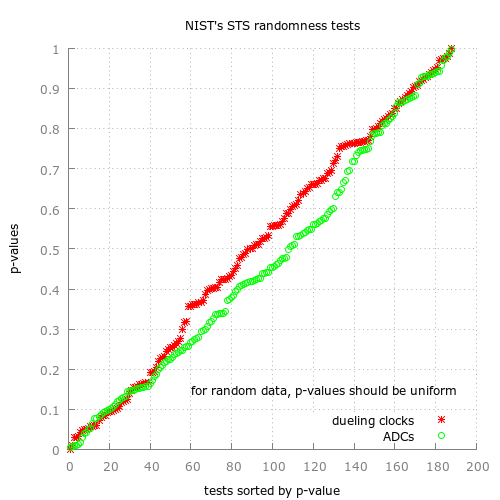proof-of-concept: generate random bits on LPC1768 using dueling clocks (systick and WDT/RTC)
random bits from dueling clocks
Using dueling clocks to generate random bits is described by Walter Anderson at https://sites.google.com/site/astudyofentropy/project-definition/timer-jitter-entropy-sources/entropy-library
There are implementations for AVR(UNO etc.) and ARM-based (teensy) MCUs.
This mbed LPC1768 implementation uses systick clock versus the RTC crystal (32khz) as a source to the WDT timer. The LPC1768 WDT interrupt cannot be cleared, so this implementation generates the random bits when they are requested. The WDT scales the source clock by /4, so the random bit rate is about 8192 bits/second. If your board doesn't have a 32khz crystal, it is also possible to source the WDT from the 4 MHz IRC oscillator.
I collected several megabytes of random bits and they passed various random-bit testers (rngtest, ent, NIST's STS).

Another mbed random bit generator using ADC noise and mixing with SHA256 is desribed at https://developer.mbed.org/users/Remco/notebook/secure-hardware-random-number-using-the-mbed and an mbed teensy 3.1 generator
One could also just use these generators to create a seed for a hash-based PRNG.
Some ARM chips have builtin hardware TRNG's (DUE, pyboard, Raspberry PI) and Intel Edison.
FYI, RNG data on other MCUs https://github.com/manitou48/DUEZoo/blob/master/RNGperf.txt
and Anderson's spreadsheet
https://docs.google.com/spreadsheet/pub?key=0AukiKiYKrSl9dHNIX19oZ0ZqNDc1RDNMa042SzhZT0E&output=html
main.cpp
- Committer:
- manitou
- Date:
- 2015-07-25
- Revision:
- 0:808fc29f4d37
File content as of revision 0:808fc29f4d37:
// random bits from systick and WDT
// based on arduino/teensy Entropy lib
// https://sites.google.com/site/astudyofentropy/project-definition/timer-jitter-entropy-sources/entropy-library
// seems WDT ISR will only fire once, so check free-running WDT periodically
// enable systick as free running 24-bit clock to beat against RTC crystal
#include "mbed.h"
Timer tmr;
Serial pc(USBTX, USBRX);
void kick() {
// restart WDT countdown
__disable_irq();
LPC_WDT->WDFEED = 0xAA;
LPC_WDT->WDFEED = 0x55;
__enable_irq();
}
void wdt_init() {
LPC_WDT->WDCLKSEL = 0x02; // Set CLK src 0 IRC 1 PCLK 2 RTC
LPC_WDT->WDTC = 0xfffffff; // max countdown
LPC_WDT->WDMOD = 0x01; // enable but no reset
kick();
}
void systick_init() {
SysTick->LOAD = 0x123456; // doesn't really matter
SysTick->VAL = 0;
SysTick->CTRL = 4 | 1; //CLKSOURCE=CPU clock | ENABLE
}
#if 0
volatile unsigned int rword;
void ticker_isr() {
uint32_t t;
t= LPC_WDT->WDTV;
while (t == LPC_WDT->WDTV); // wait til new value
rword = SysTick->VAL;
}
Ticker ticker;
#endif
// entropy collection
const uint8_t gWDT_buffer_SIZE=32;
const uint8_t WDT_POOL_SIZE=8;
uint8_t gWDT_buffer[gWDT_buffer_SIZE];
uint8_t gWDT_buffer_position;
uint8_t gWDT_loop_counter;
volatile uint8_t gWDT_pool_start;
volatile uint8_t gWDT_pool_end;
volatile uint8_t gWDT_pool_count;
volatile uint32_t gWDT_entropy_pool[WDT_POOL_SIZE];
static void collect() {
uint32_t t;
t= LPC_WDT->WDTV;
while (t == LPC_WDT->WDTV); // wait til new value
// TODO kick WDT to avoid reset when counter < 100000 or schedule
gWDT_buffer[gWDT_buffer_position] = SysTick->VAL;
gWDT_buffer_position++;
if (gWDT_buffer_position >= gWDT_buffer_SIZE)
{
gWDT_pool_end = (gWDT_pool_start + gWDT_pool_count) % WDT_POOL_SIZE;
// The following code is an implementation of Jenkin's one at a time hash
// This hash function has had preliminary testing to verify that it
// produces reasonably uniform random results when using WDT jitter
// on a variety of Arduino platforms
for(gWDT_loop_counter = 0; gWDT_loop_counter < gWDT_buffer_SIZE; ++gWDT_loop_counter)
{
gWDT_entropy_pool[gWDT_pool_end] += gWDT_buffer[gWDT_loop_counter];
gWDT_entropy_pool[gWDT_pool_end] += (gWDT_entropy_pool[gWDT_pool_end] << 10);
gWDT_entropy_pool[gWDT_pool_end] ^= (gWDT_entropy_pool[gWDT_pool_end] >> 6);
}
gWDT_entropy_pool[gWDT_pool_end] += (gWDT_entropy_pool[gWDT_pool_end] << 3);
gWDT_entropy_pool[gWDT_pool_end] ^= (gWDT_entropy_pool[gWDT_pool_end] >> 11);
gWDT_entropy_pool[gWDT_pool_end] += (gWDT_entropy_pool[gWDT_pool_end] << 15);
gWDT_entropy_pool[gWDT_pool_end] = gWDT_entropy_pool[gWDT_pool_end];
gWDT_buffer_position = 0; // Start collecting the next 32 bytes of Timer 1 counts
if (gWDT_pool_count == WDT_POOL_SIZE) // The entropy pool is full
gWDT_pool_start = (gWDT_pool_start + 1) % WDT_POOL_SIZE;
else // Add another unsigned long (32 bits) to the entropy pool
++gWDT_pool_count;
}
}
uint32_t random() {
uint32_t retVal;
while (gWDT_pool_count < 1) collect(); // gather entropy
__disable_irq(); // crtical section
retVal = gWDT_entropy_pool[gWDT_pool_start];
gWDT_pool_start = (gWDT_pool_start + 1) % WDT_POOL_SIZE;
--gWDT_pool_count;
__enable_irq();
return(retVal);
}
#define REPS 50
void display() {
uint32_t r,t;
int i;
float bps;
t=tmr.read_us();
for (i=0;i<REPS;i++)r=random();
t= tmr.read_us() -t;
bps = REPS*32.e6/t;
printf("%f bps %0x\n",bps,r);
wait(3.0);
}
void logger() {
// await start byte from host then start sending random numbers
// ./logger 5000000 for diehard tests
unsigned int rng;
char *bytes = (char *) &rng;
pc.getc(); // await byte from host
while(1) {
rng = random();
for (int i=0; i<4;i++) pc.putc(bytes[i]);
}
}
int main() {
gWDT_buffer_position=0;
gWDT_pool_start = 0;
gWDT_pool_end = 0;
gWDT_pool_count = 0;
tmr.start();
systick_init();
wdt_init();
// ticker.attach_us(&ticker_isr,1000); // 1/8192 122 us
while(1) {
display();
// logger();
// printf("rword %x\n",rword); wait(3.0);
}
}